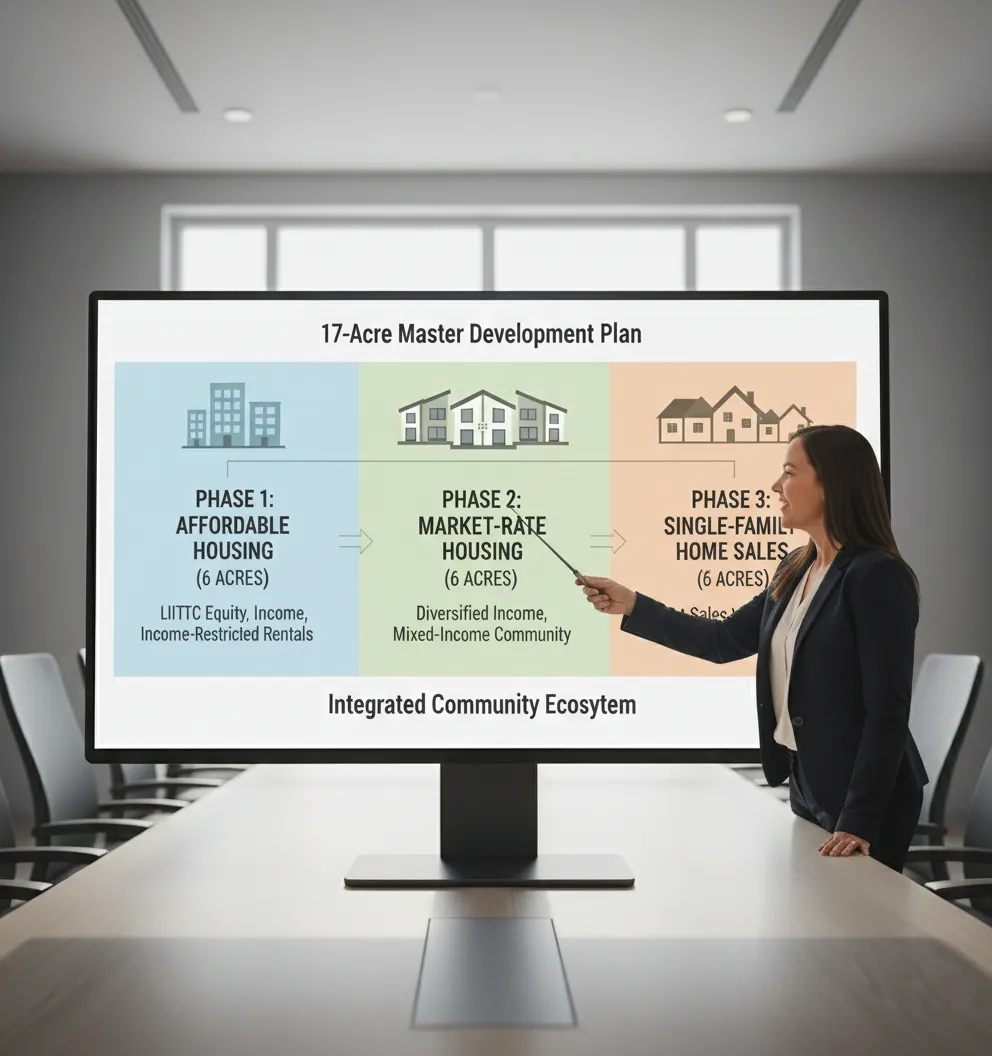
17 Acres: How to Phase Real Estate Development and Split Responsibilities + Profits - Kristi Kandel
How to Phase Affordable Housing Development: Lessons from Kristi Kandel
Introduction: Turning 17 Acres into Affordable Impact
Real estate development is never simple, but when affordable housing is part of the plan, the complexity multiplies. That’s where purpose-driven developers like Kristi Kandel stand out. Kristi is the founder of IND Consulting, a real estate developer and consultant with more than 20 years of experience navigating entitlements, construction, and community impact projects.
In this episode of the Affordable Housing & Real Estate Investing Podcast, hosted by Kent Fai He, Kristi shares how she and her partners transformed 17 acres in Nevada into a three-phase development that balanced affordable housing, market-rate units, and single-family homes. Her story is a blueprint for investors and developers who want to create impact while building sustainable communities.
How do developers phase large affordable housing projects?
When Kristi’s team acquired nearly 17 acres outside Reno, they faced a fundamental question: how do you structure land use to maximize both community benefit and financial viability?
Phase 1: Six acres dedicated to affordable housing, supported by Low-Income Housing Tax Credits (LIHTC).
Phase 2: Six acres allocated for market-rate housing to diversify income streams.
Phase 3: A subdivision on the remaining land, selling lots to builders for single-family homes.
By splitting the property into phases, Kristi and her partners created a self-sustaining ecosystem where residents could transition from affordable rentals to townhomes and eventually single-family homes, all within one community.
How do partnerships and equity splits work in affordable housing development?
One of the most valuable insights Kristi shared is how partnerships are structured in complex developments:
Limited Partner (LP): Brought the capital. Took 25% ownership of the project but stayed passive in operations.
Development Team: Kristi’s company contributed expertise and sweat equity, handling due diligence, entitlements, utilities, and construction management.
Underwriting & Property Management Partner: Managed LIHTC applications, underwriting, and long-term property operations.
Experienced LIHTC Developer: Held majority ownership (51%) to qualify for tax credits.
The developer fee, equity ownership, and cash flow were all split differently across partners. This flexibility highlights how creativity and collaboration drive affordable housing success.
What role do Low-Income Housing Tax Credits (LIHTC) play?
Kristi explained LIHTC in practical terms:
4% Credits: Useful for larger projects, typically cover around 40–45% of development costs.
9% Credits: Highly competitive, often used for smaller projects, covering up to 60–70% of costs.
Sale of Credits: Developers don’t receive cash directly; they sell credits for about 80–90 cents on the dollar to raise equity.
This complexity is why partnering with experienced LIHTC developers is often essential in early deals.
How do developers fund soft costs before construction?
Kristi emphasized that even before breaking ground, developers can spend hundreds of thousands on architects, engineers, and consultants. For new developers without deep pockets, creative strategies include:
Deferring consultant fees until construction loans close, often with a multiplier on repayment.
Offering sweat equity shares to strategic partners like architects or engineers.
Leveraging HELOCs, stock loans, or other forms of liquidity.
Building relationships with investors who have capital but lack time or expertise.
Affordable housing development is as much about resourcefulness as it is about raising cash.
Key Insights from Kristi Kandel
Phasing creates flexibility: Breaking land into phases allows developers to balance affordable, market-rate, and for-sale units.
Partnerships reduce risk: Splitting responsibilities among LPs, underwriters, and developers ensures expertise at every stage.
LIHTC is powerful but complex: Success often requires an experienced LIHTC partner at the start.
Creativity funds deals: Sweat equity and deferred fees can help cover early-stage costs.
Vision matters more than control: Developers must focus on purpose and goals rather than micromanaging every detail.
Best Quotes from Kristi Kandel
“Development in itself is complex, but to be a LIHTC developer you need to be passionate about your community, because it adds a whole new layer of complexity.”
“We always try to put as much time into our purchase contracts as possible, so we aren’t closing on land until we’re ready to put a shovel in the ground.”
“The whole game of development is how do you reduce your risk each step of the way.”
“If the numbers work, you’ll find people with money who don’t have time or expertise. That’s where strategic partnerships come in.”
“Most of running a business has nothing to do with what you’re an expert in. It’s about systems, relationships, and resilience.”
Common Questions This Episode Answers
1. How do affordable housing developers use LIHTC?
They apply for 4% or 9% tax credits, then sell them to investors to raise equity for projects.
2. Why split a development into phases?
Phasing balances risk and creates diverse housing options, making projects financially sustainable and community-driven.
3. How are responsibilities and profits divided among partners?
Each partner takes roles aligned with their strengths—capital, development expertise, underwriting, or LIHTC experience—with profits divided across ownership, fees, and cash flow.
4. How do new developers cover upfront costs?
Through deferred consultant fees, sweat equity partnerships, or leveraging personal financial tools like HELOCs or stock loans.
5. What trends will shape affordable housing development?
Kristi predicts modular construction, 3D printing, and more local partnerships will transform the industry in the next decade.

Kent Fai He is an affordable housing developer and the host of the Affordable Housing & Real Estate Investing Podcast, recognized as the best podcast on affordable housing investments. His platform continues to highlight leaders like Kristi Kandel who are reshaping communities with innovation and impact.
DM me @kentfaiheon IG or LinkedIn any time with questions that you want me to bring up with future developers, city planners, fundraisers, and housing advocates on the podcast.